Fela Kuti, The One Who Emanated Greatness | reviews, news & interviews
Fela Kuti, The One Who Emanated Greatness
Fela Kuti, The One Who Emanated Greatness
The greatest African pop star and revolutionary remembered
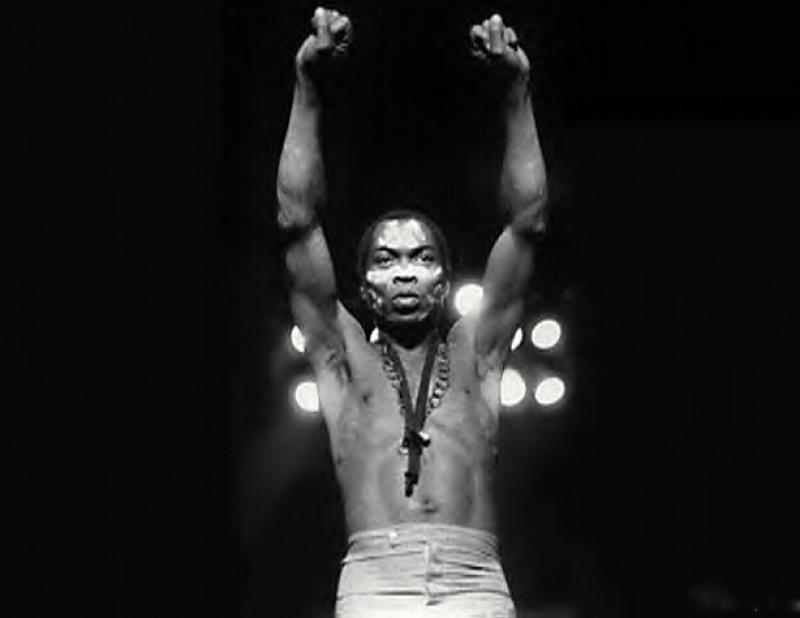
With Fela Kuti's old band playing Brighton this evening fronted by his son Seun and on the same bill as Tony Allen, the drummer who co-created the increasingly influential Afro-beat sound, it seemed a good excuse to revisit the first interview I ever got published, which was with the great African pop star in 1984 (in Blitz magazine, also a version for the Observer).
Watch Fela Kuti and his band in 1971
Paul McCartney found himself in Lagos in August 1972. The plan had been to record a new record - the record that became Band on the Run - at somewhere other than Abbey Road and EMI had offered one of its studios in Rio de Janeiro or Peking. Instead, the former Beatle insisted on the Nigerian capital, picturing himself "lying on the beach all day doing nothing and recording at night".
As he drily noted later, "it didn't turn out quite like that", what with being held up at knife point, the lepers in the streets, the omnipresent military, the corruption and the lack of security. Still, Lagos had its attractions. Chief among these was the chance to check out Fela Ransome-Kuti's band - "the best band I've ever seen live... When Fela and his band eventually began to play, after a long, crazy build-up, I just couldn't stop weeping with joy. It was a very moving experience".
Thrilled by his experience, McCartney thought of recording with some of the musicians working with the extraordinary 33-year-old firebrand. When Fela caught wind of the plan he denounced McCartney from the stage of his club and then arrived unannounced at the studio to berate him for "stealing black man's music".
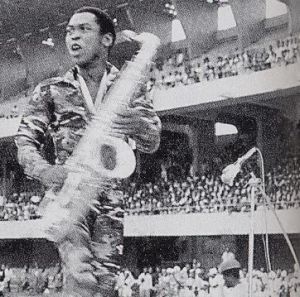 As McCartney said at the time, "We were gonna use African musicians, but when we were told we were about to pinch the music we thought, 'Well, up to you, we'll do it ourselves.' Fela thought we were stealing black African music, the Lagos sound. So I had to say, 'Do us a favour, Fela, we do OK. We're all right as it is. We sell a couple of records here and there.'
As McCartney said at the time, "We were gonna use African musicians, but when we were told we were about to pinch the music we thought, 'Well, up to you, we'll do it ourselves.' Fela thought we were stealing black African music, the Lagos sound. So I had to say, 'Do us a favour, Fela, we do OK. We're all right as it is. We sell a couple of records here and there.'
"I thought my visit would, if anything, help them, because it would draw attention to Lagos and people would say, 'Oh, by the way, what's the music down there like?' and I'd say it was unbelievable. It is unbelievable... it's incredible music down there. I think it will come to the fore."
The incident caused a brief storm in Lagos, and illustrates Fela's fearlessness, his love of controversy and an unerring ability to piss on his own parade. When Motown wanted to set up an African label in the early 1980s, it offered Fela a million-dollar deal. This despite his insistence at the time of recording radio-hostile 60-minute songs, and never playing old material, so that live audiences would never hear his hits.
Rikki Stein, one of his then managers, was hugely excited and flew to Lagos to discuss the deal. Stein says that Fela's response was to contact the spirits via his personal magician, Professor Hindu. The spirits refused to let him sign for another two years and Fela further insisted on only leasing his back catalogue. "Even then, Motown went along with it. But after two years, in April 1985, the very month that Fela was about to sign, the Motown guy got sacked and the deal was off," says Stein. "Maybe the spirits knew something."
Certainly, Fela Kuti was the ultimate rebel, a spiritualist, pan-African revolutionary and a prodigious dope smoker and polygamist. Harassed, beaten and tortured by the authorities, he was a dancer, a saxophonist and a composer. He called himself "Abami Edo", the strange one, the weird one. He dropped the Ransome part of his name - asking, "Do I look like an Englishman?" - and changed his surname to Anikulapo ("one who carries death in the pouch"). He also billed himself as the Black President, the Chief of the Shrine.
In the 1970s, McCartney wasn't the only superstar to recognise Fela's musical innovations, the way in which he fused high-life and jazz with the rhythms of funk to create "Afrobeat". When James Brown toured Nigeria in 1970, bassist William "Bootsy'" Collins recalls, "[Fela] had a club in Lagos, and we came to the club and they were treating us like kings. We were telling them they're the funkiest cats we ever heard in our life. I mean, this is the James Brown band, but we were totally wiped out! That was one trip I wouldn't trade for anything in the world."
Tony Allen, Fela's drummer and a key architect of Afrobeat, claims that Brown sent his arranger, David Mathews, to check him out. "He watches the movement of my legs and the movement of my hands, and he starts writing down... They picked a lot from Fela when they came to Nigeria. It's like both of them sort of influenced each other. Fela got influenced in America, James Brown got the influence in Africa."
Fela's influence spread in all kinds of directions. Gilberto Gil, now the Minister of Culture in Brazil, says that meeting Fela in Lagos changed his life ("I felt like I was a tree replanted and able to flourish"). Brian Eno once told me that he owned more albums by Fela than by any other artist and that he listened to him "over and over again". When he first worked with the Talking Heads, the very first album he played was by Fela. He said "this is the music of the future". It was another musician, Viv Albertine of the Slits, who first turned me on to Fela in the early Eighties and I too became obsessed with the man, puzzled as to why he wasn't one of the biggest stars in the world.
Born on 15 October 1938, Olufela Olusegun Oludotun Ransome-Kuti was the fourth of five children in a middle-class family. His father, the Reverend Israel Ransome-Kuti, was the first president of the Nigerian Union of Teachers; his mother, Funmilayo, was a political activist and feminist, also known as the first woman in Nigeria to drive a car and as the recipient of a Lenin Peace Prize who travelled to Russia and China and met Chairman Mao. His grandfather, an Anglican pastor, who encouraged Fela from an early age, had been one of the first West Africans to have his music commercially recorded, including a series of hymns in Yoruba for EMI's Zonophone label made on a trip to London in 1925.
In 1958 Fela himself was sent to London - possibly to study medicine, though he enrolled at Trinity College of Music instead. For the next four years, he studied piano, composition and theory, and made a name on the R&B club scene with his jazz and highlife band, Koola Lobitos. In 1961, he married his first wife Remi, with whom he had a son, Femi. According to J K Braimah, a friend at the time, "[He] was a nice guy, a really beautiful guy. But as square as they come. He didn't smoke cigarettes, let alone grass. He was afraid to fuck! We had to take his prick by hand, hold it and put it in for him, I swear!"
In January 1984, when I first met Fela, at the Russell Hotel in Bloomsbury, central London, I asked him which musician he most respected. The answer was unexpected. "Handel. George Frederick Handel." I told him my father was a Handel freak and we discussed, amid the dope smoke, Dixit Dominus and the Concerto Grossi.
Thinking about it, I decided a comparison wasn't improbable. In Fela's music there is the same mix of solidity and transcendence, and I thought I could detect echoes of the composer in Fela's organ lines. He told me he thought he was writing "African classical music".
"Western music is Bach, Handel and Schubert - it's good music, cleverly done, as a musician I can see that. Classical music gives musicians a kick. But African music gives everyone a kick. Once you get music with a beat, that is African music.
"Jazz was the beginning of rhythm music, which developed into rock and roll. But what the jazz musicians lost because they were so far from their homeland was the intricate rhythms of African music."
"Can Europeans play African music?", I asked. "I tell you something. When I was in London 20 years ago, the white boys couldn't dance, now they dance quite well."
Returning to Lagos, Fela worked as a trainee radio producer with Nigerian Broadcasting, and re-formed Koola Lobitos. But it was the band's first trip to the USA in 1969 that saw the sound really change, while Fela began a personal evolution, talking the language of revolution for the first time. Broke, depressed and working as an illegal immigrant now his visa had expired, he met Sandra Smith at one of the band's gigs at New York's Ambassador Hotel. She was a member of the Black Panther Party, the pair became lovers and she turned him on to Eldridge Cleaver and Malcolm X, persuading him to write "conscious" lyrics.
Fela's band, now called Africa 70, came into its own back in Lagos - the hits started coming, Fela coined the term "Afrobeat" and set up a kind of hippie commune in a large house. Upwards of 100 people lived there - the band, roadies and anyone involved with the nightclub Fela set up, originally called the Afro-Spot and then the Shrine. And Fela became a hero of the underclass. A typical swipe at the ruling elite was found on the song "Gentleman", on which he ridiculed those who wore western fashions in Africa: "Him put him socks him put him shoes, him put him pants him put him singlet, him put him trouser him put him shirt, him put him tie, him put him coat, him cover over all with him hat him go sweat all over, him go faint right down, him go smell like shit."
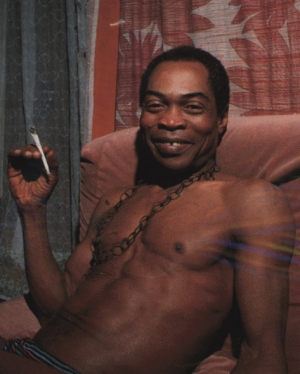 The authorities responded by sending the army to arrest Fela, razing his home almost to the ground. Fela promptly recorded a track titled after the Lagos prison ("Alagbon Close"), spoofing the authorities.
The authorities responded by sending the army to arrest Fela, razing his home almost to the ground. Fela promptly recorded a track titled after the Lagos prison ("Alagbon Close"), spoofing the authorities.
When I walked into Fela's hotel room on that cold January afternoon, the self-styled Black President, The One Who Emanates Greatness, Carries Death In His Quiver and Cannot Be Killed By Human Entity was wearing just a pair of red underpants, smoking a cigar-sized spliff and watching a B-movie. The 22-year-old Femi was there too along with three wives and Professor Hindu (aka a Ghanaian called Kwaku Addaie).
At a show at London's Town and Country Club that week, the Professor, to the bafflement of a sceptical audience, had cut his own tongue, magicked watches and clothes from nowhere and asked for a volunteer from the audience whose throat he seemed to cut before burying him outside the venue in a grave he had dug earlier. Two days later 200 people witnessed the volunteer's disinterment - he explained that being buried makes people extremely horny and propositioned the music journalist Vivien Goldman, pleading, "I have money. Plenty money" and waving a hotel key.
"Everything was going against me," Fela said of Hindu. "Since I met him four years ago, I've seen so much spiritual light." Fela said Hindu knows the past and the future, and he used him to talk to his dead mother each night.
I had come to know Fela through records such as "Algabon Close" and "Zombie". You could make a case for 1976's most revolutionary record being not "Anarchy in the UK" but this second, perfectly conceived slice of pop subversion, with its killer groove sounding like no one else, thunderous brass with wonderful trumpet from Lester Bowie and lyrics in pidgin English attacking the mindlessness of the Nigerian military ("Zombie no go turn unless you tell am to turn/ Zombie no go think unless you tell to think").
Watch "Zombie" by Fela Kuti, 1976's most revolutionary record
Fela's robotic stage moves had been copied by protesters in riots against the government. He was banned from Ghana for being "liable to cause a breach of the peace" and this song provoked an attack on his new commune, named by Fela the Kalakuta ("Rascal") Republic. Indeed, Fela had declared independence from the repressive Nigerian state. On 18 February 1977, more than 1,000 armed soldiers surrounded the compound, set fire to the generator, and brutalised the occupants. Fela alleged he was dragged by his genitals from the main house, beaten, and only escaped death following the intervention of a commanding officer. Many women were raped and the 78-year-old Funmilayo was thrown through a window. She subsequently died.
Fela kept up the polemic, delivering his mother's coffin to the army barracks and writing the song "Coffin for Head of State". One of his masterpieces, "Unknown Soldier", followed an official inquiry that claimed the commune was destroyed by "an exasperated and unknown soldier".
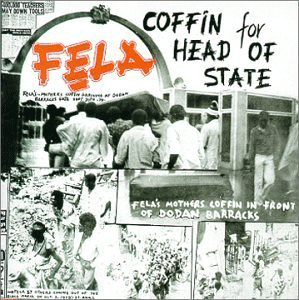 According to John Collins, who knew Fela in the 1970s and is the author of Fela: Africa's Musical Warrior, "In his songs [Fela] went much further than the usual round-up of protest singers such as Bob Dylan, James Brown or Bob Marley. Fela's songs not only protested against various forms of injustice but often fiercely attacked specific agencies and members of the Nigerian government." His targets even included the US multinational International Telephones and TeleCommunications, on "International Thief Thief (ITT)".
According to John Collins, who knew Fela in the 1970s and is the author of Fela: Africa's Musical Warrior, "In his songs [Fela] went much further than the usual round-up of protest singers such as Bob Dylan, James Brown or Bob Marley. Fela's songs not only protested against various forms of injustice but often fiercely attacked specific agencies and members of the Nigerian government." His targets even included the US multinational International Telephones and TeleCommunications, on "International Thief Thief (ITT)".
In 1978, Fela had set up an organisation called Movement For The People and said he wanted to run for president but the authorities kept him off the ballot by various legal stratagems. I asked him, when we met, if he thought he could ever be president of Nigeria. "Spiritually speaking, every human being has a destiny and a duty to perform," he said. "No African has ever seen anything like me - they see me sticking to my guns through all the violence.
"In the last military regime I was the only one to speak out against the government and the army. Anything could happen in Nigeria. If they get to the point that everyone trying to rule the place isn't making any headway they might drop their guard and ask, 'Fela, do you want to rule us today?'"
So what sort of regime would he run?
"It would be a cultural and spiritual revolution. Every individual would feel like a president - nothing would obstruct people getting what is due to them."
Watch the video of "Army Arrangement"
The fumes in the room were getting thick. I was trying not to look at his wives, nor seem that I was deliberately not looking at them. Also in 1978, to mark the anniversary of the pillage of Kalakuta, he married 27 of his dancers simultaneously. Fela claimed this was a traditional Yoruba ceremony, although some priests disputed this, pointing out that no bride prices were paid, and there is a suggestion that some sort of immigration scam was also involved. It was certainly a fabulous publicity stunt, although as DJ Rita Ray, who runs a Fela-inspired club called Shrine in London, points out, "Dancers weren't held in high esteem, so his argument was that he was making them respectable. He was wild, but very progressive."
In our meeting, I asked him about the importance of sex. "Sex is one of the most important things in life, man. It's Christianity and Islam that have made sex immoral. People should be proud to say, 'I had a fantastic fuck last night.' When a minister in Britain has an affair he loses his job. If a minister in Africa fucks 400 women no one will even notice him, you know."
In songs such as "Lady" and "Mattress" the impression he gave was that women were inferior. "I'm not saying that women should not be political leaders," he said. "Women can do what they want - but once she's married in Africa she can't do anything against her husband's will. If a woman doesn't like a man she should find another - that's why polygamy is so fantastic. An African man should not do anything called housework or cooking..." But, Fela, cooking can be fun, I persisted. "I can cook, I had to as a student in London. But if I have a party and do cooking, people call me a 'Less Man'. I don't see why I should go against the cultural values of my people."
So what is the gay scene like in Lagos? "I've seen a few boys behave like sissies, you know. I found they had gone to England and been corrupted. If you are gay in Africa no one must know about it - they will stone you to death, man."
Fela claimed Aids was a "white man's disease", but he caught the virus and died from complications on 2 August, 1997, at the age of 58. At the time we met, 12 of his 27 wives remained - he told me he employed a rota system to keep them satisfied - but following a 27-month jail sentence that began later that year (on a trumped-up charge of currency smuggling) he divorced them all. "Marriage brings jealousy and selfishness," he was quoted as saying. His manager, Rikki Stein, maintains that "sex was where his inspiration came from, and considering the number of great albums he made... In the Eighties, on tour, I witnessed fur-wrapped beauties queuing up for their turn".
Pictured below: Fela with several wives
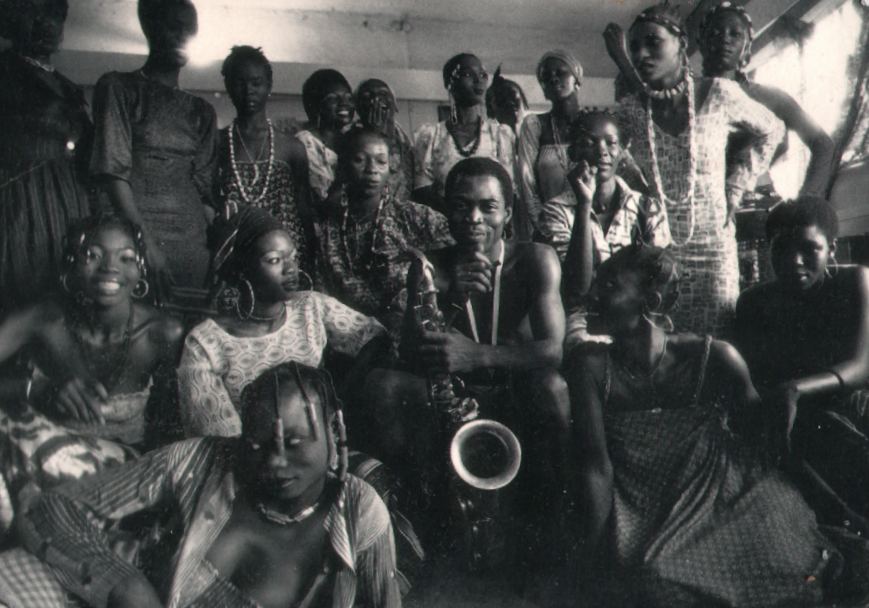
Fela's last song had been called "C.S.A.S (Condom Scallywag and Scatter)", which described the use of condoms as "un-African". To the end, Fela refused to be tested to determine the cause of his weight loss and skin lesions. After much discussion among the family after his death, his brother, Dr Beko Ransome-Kuti, publicly disclosed the cause, paradoxically enabling, as one commentator put it, "Aids awareness in Nigeria to leave the dark ages". In that sense, Fela's death helped save a lot of lives, although it's impossible to know how many women he himself put in mortal danger by his wilful denial of his disease. Stein says that "one or two women in Fela's entourage became ill, though I don't know whether it had anything to do with Fela. All the rest are still going strong, as I understand it. They say it was Aids. I say that he died of one beating too many. He was a giant of a man, but a man nevertheless". It might otherwise be observed that it was a wilful contrariness - the same impulse that always animated Fela - that ultimately killed him.
More than a million mourners filled the streets of Lagos. Towards the end of his life, as his energy waned, Fela was less involved with political crusades. Nonetheless, according to his son Femi, "For two days, people didn't do any work in Lagos! This is the first time in the history of Lagos they have not had a complaint of robbery, rape or anything. Because all the robbers, the bad boys, they loved him, you know? Everybody was busy at the funeral."
One irony is that Fela, if anything, is more popular worldwide than when he was alive - his music is sampled by producers like Timbaland (on Missy Elliott's "Watcha Gonna Do"), while Damon Albarn voted "Zombie" the "sexiest ever track". In fact, the Blur singer worked in Lagos on a project with Tony Allen.
And Femi Kuti carries the family torch with his own band, Positive Force, while another son, Seun - a recent graduate of the Liverpool Institute of Performing Arts, the "fame academy" endowed by Paul McCartney - fronts a version of Fela's old group Egypt 80. I spoke to Seun on the day he was supposed to be at his graduation ceremony, where he would have met Sir Paul. Instead, Seun - who's anti-marriage, and pro-dope, rebellion and black consciousness - leapt on a plane to Lagos. He said he had better things to do.
Fela Kuti's biographer Michael Veal worried that "Fela's message of African empowerment became increasingly intertwined with dominant racist stereotypes of the African as vulgar, intoxicated, primitive, hypersexualised and an indigenous mystic".
For the 20-year-old Seun, his father "was a gift, an inspiration to Africa - there will never be another like him. But things in Nigeria are even worse now, and however hard it is to live up to his legacy, we have to carry on the fight for liberation and consciousness".
Did Fela ever fail himself? It is not likely that he ever felt that way; he told me he was a fatalist. "Even death doesn't worry me, man. When my mother died it was because she finished her time on earth. I know that when I die I'll see her again, so how can I fear death?
"So what is this motherfucking world about? I believe there is a plan... What I am experiencing today completely vindicates the African religions. I will do my part - then I'll just go, man. Just go!"
- 1938 Born 15 October in Abeokuta, Nigeria to politically active and middle-class family.
- 1958 Sent to London to train as a doctor, but instead enrolled in the Trinity College of Music. Formed Koola Lobitos in 1961.
- 1969 Took Koola Lobitos to Los Angeles. His political zeal was fired when he befriended radical black activists including Angela Davis.
- 1971 Kuti renames his band Afrika 70 (and later Eygpt 80), and, newly politicised, he determines to give voice to Nigeria's underclass.
- 1974 After he enraged the Nigerian establishment, the army almost destroyed Kuti's home while trying to arrest him.
- 1977 In a second government-sanctioned attack, 1,000 soldiers descended on Kuti's compound. He suffered a fractured skull, arm and leg in the onslaught and his 78-year-old mother was thrown from an upstairs window. He left for voluntary exile in Ghana.
- 1978 Ghanian authorities deported Kuti back to Lagos. On his arrival he married 27 women simultaneously. Divorcing them in 1986, he said, "No man has the right to own a woman's vagina."
- 1979 Founded his own political party MOP (Movement of the People)
- 1984 Jailed in Nigeria for five years on what was regarded as sham currency smuggling charges, and released in 1986 after a change of government.
- 1996 Arrested and released on an alleged drug charge.
- 1997 Died of complications from Aids aged 58.
- Brighton Festival is on until 23 May
- Find Fela Kuti on Amazon
Add comment
The future of Arts Journalism
You can stop theartsdesk.com closing!
We urgently need financing to survive. Our fundraising drive has thus far raised £49,000 but we need to reach £100,000 or we will be forced to close. Please contribute here: https://gofund.me/c3f6033d
And if you can forward this information to anyone who might assist, we’d be grateful.

Subscribe to theartsdesk.com
Thank you for continuing to read our work on theartsdesk.com. For unlimited access to every article in its entirety, including our archive of more than 15,000 pieces, we're asking for £5 per month or £40 per year. We feel it's a very good deal, and hope you do too.
To take a subscription now simply click here.
And if you're looking for that extra gift for a friend or family member, why not treat them to a theartsdesk.com gift subscription?
more New music
 Album: The Black Keys - No Rain, No Flowers
Ohio rockers' 13th album improves on recent material, but still below mainstream peak
Album: The Black Keys - No Rain, No Flowers
Ohio rockers' 13th album improves on recent material, but still below mainstream peak
 Wilderness Festival 2025 review - seriously delirious escapism
A curated collision of highbrow hedonism, surreal silliness and soulful connection
Wilderness Festival 2025 review - seriously delirious escapism
A curated collision of highbrow hedonism, surreal silliness and soulful connection
 Album: Ethel Cain - Willoughby Tucker, I'll Always Love You
Relatively straightforward songs from the Southern Gothic star - with the emphasis on 'relatively'
Album: Ethel Cain - Willoughby Tucker, I'll Always Love You
Relatively straightforward songs from the Southern Gothic star - with the emphasis on 'relatively'
 Album: Black Honey - Soak
South Coast band return with another set of catchy, confident indie-rockin'
Album: Black Honey - Soak
South Coast band return with another set of catchy, confident indie-rockin'
 Album: Molly Tuttle - So Long Little Miss Sunshine
The US bluegrass queen makes a sally into Swift-tinted pop-country stylings
Album: Molly Tuttle - So Long Little Miss Sunshine
The US bluegrass queen makes a sally into Swift-tinted pop-country stylings
 Music Reissues Weekly: Chip Shop Pop - The Sound of Denmark Street 1970-1975
Saint Etienne's Bob Stanley digs into British studio pop from the early Seventies
Music Reissues Weekly: Chip Shop Pop - The Sound of Denmark Street 1970-1975
Saint Etienne's Bob Stanley digs into British studio pop from the early Seventies
 Album: Mansur Brown - Rihla
Jazz-prog scifi mind movies and personal discipline provide a... complex experience
Album: Mansur Brown - Rihla
Jazz-prog scifi mind movies and personal discipline provide a... complex experience
 Album: Reneé Rapp - Bite Me
Second album from a rising US star is a feast of varied, fruity, forthright pop
Album: Reneé Rapp - Bite Me
Second album from a rising US star is a feast of varied, fruity, forthright pop
 Album: Cian Ducrot - Little Dreaming
Second album for the Irish singer aims for mega mainstream, ends up confused
Album: Cian Ducrot - Little Dreaming
Second album for the Irish singer aims for mega mainstream, ends up confused
 Album: Bonniesongs - Strangest Feeling
Intriguing blend of the abstract, folkiness, grunge and shoegazing from Sydney
Album: Bonniesongs - Strangest Feeling
Intriguing blend of the abstract, folkiness, grunge and shoegazing from Sydney
 Album: Debby Friday - The Starrr of the Queen of Life
Second from Canadian electronic artist and singer offers likeable, varied EDM
Album: Debby Friday - The Starrr of the Queen of Life
Second from Canadian electronic artist and singer offers likeable, varied EDM
 Music Reissues Weekly: The Pale Fountains - The Complete Virgin Years
Liverpool-born, auteur-driven Eighties pop which still sounds fresh
Music Reissues Weekly: The Pale Fountains - The Complete Virgin Years
Liverpool-born, auteur-driven Eighties pop which still sounds fresh

Comments
...